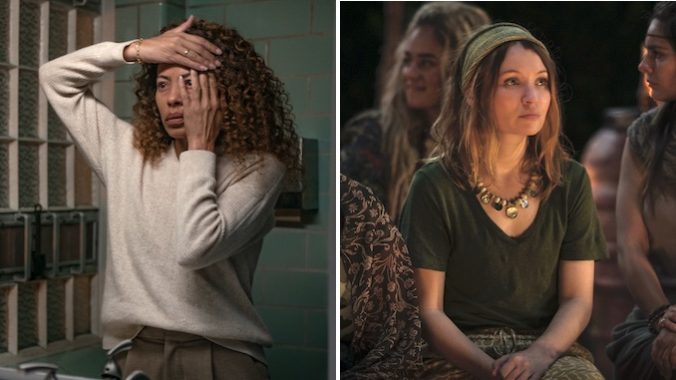Yellowjackets, Class of ‘07, and Why You Shouldn’t Wait Until the End of the World to Heal

It’s the end of the world, and you’re stuck on a desert island, which is actually just your old high school, and the only people left in the whole world are your old classmates, and they all hate you. In Amazon Prime Video’s dark comedy Class of ‘07, Zoe (Emily Browning) can’t seem to wake up from this cascading nightmare.
Elsewhere in the world of Prestige TV, a sinister, supernatural force isolates a group of young women deep in the woods in Showtime’s nostalgic drama series. It’s not The End of The World, just the end of their world. We know only a few of these girls will make it to adulthood; they’ll make it out of the woods, through college, and onto marriage and maybe parenthood, all while pushing down the thoughts of what happened during their 19-month stint in the forest further and further until there are no memories, only the carefully crafted stories they agreed to tell. There’s little or no contact between the survivors of the plane crash that stranded the Yellowjackets all those years ago, but this is because the women of Yellowjackets are all perfectly fine, thank you very much! Nope, no trauma, nothing to think about anymore.
In both Yellowjackets and Class of ‘07, these high-concept plots draw you in and set the stage for what’s even more resonant than gore and promises of cannibalism: vulnerable women who need each other so deeply but just can’t bear to admit it to each other. Despite their lives being so inseparably entangled, they all fear closeness. No one holds onto shared experiences the same way and there’s no such thing as a perfect memory. Shame, guilt, embarrassment—whatever you want to blame for the silence—it’s easier to avoid the past than address it. But throw in a bit of catastrophe and all of a sudden avoidance is off the table.
Framing both of these character dramas around such graphic narratives allows the true breadth of each series to sneak up on us. In an era of Too Much TV, the hook is more than important, it’s essential. Streaming metrics are measured in raw data, in minutes watched, in episodes clicked. Corporate decisions regarding what is and isn’t worth saving as the streaming era loses steam and profits begin to falter are disconnected from the art. The marketing for something like Class of ‘07 reflects that to a fault. It might be true that “apocalyptic tidal wave wipes out the world” is more appealing on paper to a wider audience than “women revisiting high school trauma,” but it does a disservice to how truly moving the series is. And the same goes for reducing Yellowjackets to survival and cannibalism. These shows are powerful examples of how hard it is to relive the past and how essential it is for healing.
One element that elevates Class of ‘07 is the unconditional empathy that pulses through the series from its opening moments. Zoe is fleeing national embarrassment when the apocalypse comes for her, having been abandoned in the finale of a certain ubiquitous reality romance TV franchise. When her formerly-soon-to-be-fiancé alleges she came on the show seeking fame, not love, he’s clearly touched a nerve. This is not the first time Zoe has been accused of climbing the social ladder by any means necessary. Just like that, she regresses to a petulant, angry kid. In the fallout of her explosion, she moves off-grid, living in a camper, praying the internet hive-mind moves on to the next pathetic girl who got suckered by the false promises of reality TV soon. When the earth splits beneath her and she seeks shelter at her old high school, instead of finding other scared evacuees, she finds a different kind of horror—her ten-year class reunion. At this point, radio and cell phone towers are already down, but still, none of her classmates believe her. Zoe’s reputation precedes her and this is obviously just another ploy for attention.
It’s easy to make fun of the women like Zoe who go on these shows only to be humiliated on a national if not global scale. These shows are designed to disconnect the face on the screen from a real human being, and this is an admission coming from a proud reality television connoisseur. But while her peers may judge her that harshly, Class of ‘07 resists the trap as a series. Zoe is problematic and messy and self-centered, but that doesn’t mean she isn’t worthy of the respect and forgiveness this series extends to her and every one of her classmates.
-

-

-

-

-

-

-

-

-

-

-

-

-

-

-

-

-

-

-

-

-

-

-

-

-

-

-

-

-

-

-

-

-

-

-

-

-

-

-

-








































